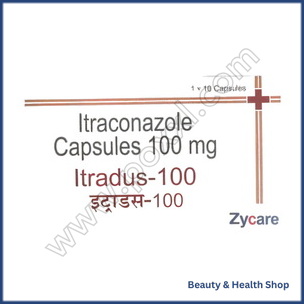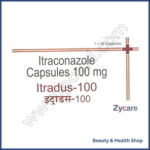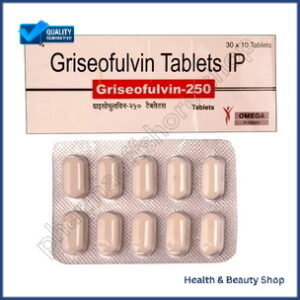ADDICTION
ALCOHOL DEPENDENCE
QUIT SMOKING
ALLERGY
ANTI FUNGAL
FUNGAL INFECTION
FUNGAL NAIL INFECTIONS
ANTI-REJECTION DRUGS
ANTI WORM
ANTIBIOTIC
BACTERIAL INFECTIONS
ARTHRITIS
GOUT
OSTEOARTHRITIS
RHEUMATOID ARTHRITIS
BLOOD
LOW PLATELET COUNT
THROMBOPHLEBITIS
VARICOSE VEINS
COLON
ANAL FISSURE
PILES
ULCERATIVE COLITIS
DIABETES CARE
DIABETES INSIPIDUS
DIABETES TYPE
DIABETIC FOOT ULCERS
GLUCOSE MONITOR
EYES/EAR CARE
DRY EYES
EYE CARE
EYE EXAMINATION
EYE INFECTION
EYE LASHES
EYE PAIN
GLAUCOMA
OCULAR HYPERTENSION
UVEITIS
FEVER CARE
MALARIA
RHEUMATIC FEVER
TYPHOID FEVER
GASTROINTESTINAL
ACIDITY
CONSTIPATION
CROHN'S DISEASE
DIARRHOEA
GALLBLADDER STONES
INTESTINAL ULCERS
IRRITABLE BOWEL SYNDROME
MOTION SICKNESS
NAUSEA
Itradus 100 mg (Itraconazole)
| Active Ingredient (Generic Name): | Itraconazole |
|---|---|
| Indication: | Fungal infections |
| Manufacturer: | Zydus Cadila Pharma |
| Packaging: | 10 capsules in one strip |
| Strength: | 100 mg |
From: $94.00
Itradus 100 mg (Itraconazole) treats fungal infections by inhibiting fungal cell membrane synthesis, causing fungal death. Take the standard once-daily dose with or without food for the duration prescribed. Finish the full course to avoid resistant strains. It’s used for severe infections or treatment failures, suitable for various body part infections and weakened immune systems. Follow the healthcare provider’s instructions precisely, maintaining consistent dosing times. Avoid skipping doses, stopping early, or missing a dose. Caution on drug interactions, side effects, storage, and disposal. Seek help for an overdose. Inform healthcare providers on allergies and medical history, avoid grapefruit. Options are available under different brand names for this essential medication.
Start your journey with Itradus 100 mg by understanding its mechanism of action and dosage instructions. Itradus is an antifungal medication that works by inhibiting the synthesis of ergosterol, a vital component of fungal cell membranes. By disrupting this process, Itradus weakens the cell membrane, leading to the death of the fungi. It is commonly prescribed to treat various fungal infections, such as aspergillosis, blastomycosis, and histoplasmosis.
When it comes to dosage instructions, it is essential to follow your healthcare provider’s recommendations diligently. Typically, the standard dose for Itradus 100 mg is once daily, with or without food. The duration of treatment may vary depending on the type and severity of the fungal infection you are dealing with. It is crucial to complete the full course of medication, even if you start feeling better before the treatment is over. Missing doses or stopping the medication prematurely can lead to the reoccurrence of the infection and the development of drug-resistant strains. If you have any questions or concerns about the dosage, do not hesitate to consult your healthcare provider for guidance.
Why is this medication prescribed?
To understand why Itradus 100 mg is prescribed, consider its effectiveness in combating various fungal infections by targeting the synthesis of ergosterol in fungal cell membranes. This medication is commonly used to treat fungal infections such as aspergillosis, blastomycosis, histoplasmosis, and onychomycosis. As a potent antifungal agent, Itradus 100 mg works by inhibiting the growth of fungi, preventing them from multiplying and causing further infection. It is often prescribed when other antifungal medications have not been effective or when the infection is severe.
Doctors may recommend Itradus 100 mg for conditions like fungal pneumonia, fungal infections in the bloodstream, and fungal infections in the esophagus or other parts of the body. Additionally, this medication can be beneficial for patients with weakened immune systems, such as those undergoing chemotherapy or organ transplant recipients, who are more susceptible to fungal infections. It is essential to follow your healthcare provider’s instructions carefully when taking Itradus 100 mg to ensure the best treatment outcomes.
How should this medicine be used?
When using Itradus 100 mg, follow the dosage instructions provided by your healthcare provider for the best treatment results. Typically, this medication is taken by mouth with a full glass of water. It is important to take Itradus exactly as prescribed, at the same times each day, to maintain a consistent level of the drug in your body. Do not skip doses or stop taking the medication early, even if you start feeling better, as this may lead to the infection not being fully treated. If you forget to take a dose, take it as soon as you remember, unless it is almost time for your next dose. In that case, skip the missed dose and continue with your regular dosing schedule. It is essential to complete the full course of treatment, as stopping early could result in the infection returning or becoming resistant to the medication. If you have any questions or concerns about how to use Itradus 100 mg, consult your healthcare provider for guidance.
Other uses for this medicine
Consider consulting with your healthcare provider to explore potential alternative uses for Itradus 100 mg beyond its primary intended purpose. While Itradus is primarily prescribed for fungal infections like yeast infections, athlete’s foot, and ringworm, it may also have off-label uses. Some healthcare providers may recommend Itradus for treating certain types of pneumonia, aspergillosis, or even histoplasmosis. Additionally, Itradus has shown promise in treating certain skin conditions like eczema or psoriasis when other treatments have not been effective. In some cases, it may be used in combination with other medications to manage these conditions. However, it is important to note that using Itradus for off-label purposes should only be done under the guidance and supervision of a qualified healthcare professional. They can assess your specific situation, weigh the potential benefits against the risks, and determine if using Itradus for an alternative purpose is suitable for you. Always follow your healthcare provider’s instructions carefully when using Itradus for any condition.
What special precautions should I follow?
Before initiating Itradus 100 mg (Itraconazole), it is crucial to check for any possible drug interactions with your other medications. Be sure to notify your healthcare provider about all the medicines you are currently taking, including prescription, over-the-counter, vitamins, and herbal supplements. This precaution helps avoid any harmful interactions and guarantees the safe and effective use of Itradus 100 mg.
Check for Drug Interactions
Be cautious and watch out for potential drug interactions while using Itradus 100 mg (Itraconazole). Here are some essential precautions to keep in mind:
- Consult your healthcare provider: Before initiating Itradus 100 mg, notify your doctor about all medications, supplements, and herbal products you are taking.
- Be aware of potential interactions: Some medications like certain antibiotics, antacids, and blood thinners may interact with Itraconazole.
- Monitor for side effects: Keep an eye out for any unusual symptoms or changes in your health that may indicate a drug interaction.
- Report any concerns: If you experience any adverse effects or suspect an interaction, contact your healthcare provider immediately for guidance.
What special dietary instructions should I follow?
To sustain top absorption of Itradus 100 mg (Itraconazole), make sure you take it with a meal containing nutritious fats. Including healthy fats like avocado, nuts, or olive oil in your meal can enhance the absorption of Itraconazole into your bloodstream. It is advisable to avoid grapefruit or grapefruit juice while taking Itradus 100 mg as they can interact with the medication and affect its effectiveness. Additionally, try to maintain a consistent diet while on Itraconazole, as changes in your diet may impact how your body absorbs the medication. Remember to stay hydrated by drinking an adequate amount of water throughout the day, as proper hydration can also support the absorption of Itraconazole. If you have any concerns about your diet or how it may affect your medication, consult your healthcare provider or a registered dietitian for personalized advice. Following these dietary instructions can help optimize the effectiveness of Itradus 100 mg in treating your condition.
What should I do if I forget a dose?
If you fail to take a dose of Itradus 100 mg (Itraconazole), take it as soon as you recall. However, if it is nearly time for your next scheduled dose, skip the missed dose and continue with your regular dosing schedule. Do not double up on doses to compensate for the missed one, as this can increase the risk of experiencing side effects.
It is crucial to maintain a consistent dosing schedule when taking Itraconazole to guarantee the medication works effectively in your system. Setting a daily reminder or integrating taking the medication into your daily routine can help reduce the chances of forgetting a dose.
If you often forget to take your medication or have difficulty remembering, consider using a pill organizer or setting up reminders on your phone. Additionally, discussing with your healthcare provider about any challenges you encounter in adhering to your medication schedule can help them provide you with additional support or guidance.
What side effects can this medication cause?
Itradus 100 Mg (Itraconazole) can cause some serious side effects that require immediate medical attention. If you notice any persistent side effects or experience symptoms like severe dizziness, irregular heartbeat, or difficulty breathing, contact your doctor right away. It’s vital to be aware of these potential side effects and seek medical help promptly if you encounter any concerning symptoms.
Persistent Side Effects Alert
When taking Itradus 100 mg (Itraconazole), be mindful of the potential lasting side effects it can cause.
- Gastrointestinal Issues: You may experience enduring stomach upset, nausea, or diarrhea.
- Skin Reactions: Watch out for persistent skin rashes, itching, or changes in skin color.
- Liver Function: Monitor for lasting jaundice, dark urine, or abdominal pain which might indicate liver problems.
- Neurological Symptoms: Be cautious of persistent headaches, dizziness, or tingling sensations in extremities.
Remember to consult your healthcare provider if you notice any of these lasting side effects while taking Itradus 100 mg (Itraconazole) to ensure proper management and guidance.
Some side effects can be serious. If you experience any of the following symptoms, call your doctor immediately:
Serious side effects of this medication may include severe allergic reactions. If you experience any of the following symptoms, call your doctor immediately:
- Difficulty breathing or tightness in the chest.
- Swelling of the face, lips, tongue, or throat.
- Severe dizziness or fainting.
- Severe skin rash, blistering, or peeling.
These symptoms could indicate a severe allergic reaction that requires immediate medical attention. It is essential to seek help promptly if you encounter any of these signs while taking Itradus 100 Mg (Itraconazole) to safeguard your safety and well-being.
What should I know about the storage and disposal of this medication?
To properly store and dispose of Itradus 100 mg (Itraconazole), follow these guidelines. Store the medication at room temperature away from moisture and heat. Keep it in its original packaging, tightly closed, and out of reach of children and pets. Avoid storing it in the bathroom or kitchen where moisture levels can be high. Check the expiration date on the packaging and do not use the medication if it has expired.
When it comes to disposal, do not flush Itradus 100 mg down the toilet or pour it into a drain unless instructed to do so. Properly discard any unused medication or expired Itraconazole by following local guidelines or consulting a pharmacist. You may also inquire if there are any drug take-back programs in your area for safe disposal. It is essential to dispose of medications responsibly to prevent accidental ingestion by others and to protect the environment. If you have any questions regarding storage or disposal, seek advice from a healthcare professional or pharmacist.
In case of an emergency/overdose
If an emergency or overdose occurs with Itradus 100 mg (Itraconazole), promptly seek medical assistance. In case of an overdose, contact your local poison control center or emergency room immediately. Symptoms of an overdose may include nausea, vomiting, dizziness, confusion, or fainting. Do not wait for symptoms to worsen before seeking help.
When seeking medical assistance, be prepared to provide information about the amount of Itradus 100 mg ingested, the time of ingestion, and any symptoms experienced. It is vital to act quickly in cases of overdose to prevent potential complications.
If someone collapses or has trouble breathing after taking Itradus 100 mg, call emergency services immediately. Stay with the person until help arrives, and do not try to induce vomiting unless instructed by medical professionals. Remember, prompt action can make a significant difference in the outcome of an overdose situation.
What other information should I know?
For additional information, seek guidance from your healthcare provider or pharmacist regarding Itradus 100 mg (Itraconazole). It is important to inform your healthcare provider about any allergies you have, especially to antifungal medications. Let them know about your medical history, especially if you have liver disease, heart issues, or a weakened immune system.
During treatment with Itradus 100 mg, avoid consuming grapefruit or grapefruit juice as it may interact with the medication. Inform your healthcare provider about any other medications, vitamins, or herbal supplements you are taking, as they could interact with Itraconazole.
While using Itradus 100 mg, it is essential to follow the prescribed dosing schedule and not exceed the recommended dose. If you miss a dose, take it as soon as you remember, unless it is close to the time for your next dose. In that case, skip the missed dose and continue with your regular dosing schedule. If you have any concerns or questions about your treatment with Itradus 100 mg, do not hesitate to consult your healthcare provider or pharmacist for guidance.
Brand names
When considering brand names for Itradus 100 mg (Itraconazole), look for variations that may be available in different markets or regions. You may find that Itraconazole is marketed under different brand names depending on the country or manufacturer. Below is a table displaying some common brand names for Itraconazole:
| Brand Name | Manufacturer |
|---|---|
| Itradus | ABC Pharmaceuticals |
| Sporanox | XYZ Pharma |
| Canditral | PQR Med |
| Itrazole | LMN Labs |
It’s crucial to note that the active ingredient in all these brand names is Itraconazole, despite the variations in the product names. When purchasing Itradus 100 mg or any other brand of Itraconazole, make sure you are aware of the active ingredient to avoid any confusion. Familiarizing yourself with these brand names can help you identify Itraconazole products in different markets or regions.
Purchase Options for Itradus
To explore purchase options for Itradus, consider the availability of the brand names mentioned for Itraconazole in various markets or regions. Itradus, also known as Itraconazole, may be purchased under different brand names depending on the country or region. Some common brand names for Itraconazole include Sporanox, Onmel, and Tolsura. These brand names may vary in availability and cost across different markets.
When looking to purchase Itradus, it is essential to check the availability of these brand names in your specific location. Prices and availability can differ, so researching local pharmacies or online retailers can help you find the best option for obtaining Itradus. Additionally, consulting with a healthcare provider or pharmacist can provide guidance on where to purchase Itradus and the most cost-effective options available.
To summarise
To summarize, contemplate evaluating the availability and pricing of different brand names such as Sporanox, Onmel, and Tolsura when seeking to purchase Itradus. These brand names contain the same active ingredient, itraconazole, but may differ in cost and formulation. Sporanox, available in capsule and oral solution forms, is a well-known brand with various generics, potentially offering cost-effective options. Onmel, an extended-release tablet, provides a convenient once-daily dosing option for some individuals. Tolsura, a newer formulation, comes in delayed-release capsules, potentially enhancing absorption and tolerability. When deciding which brand to choose, consider factors such as your healthcare provider’s recommendation, insurance coverage, and personal preferences. Additionally, check for promotions, discounts, or patient assistance programs that may reduce out-of-pocket expenses. By carefully evaluating the availability and pricing of these brand names, you can make an informed decision that aligns with your healthcare needs and financial considerations.







